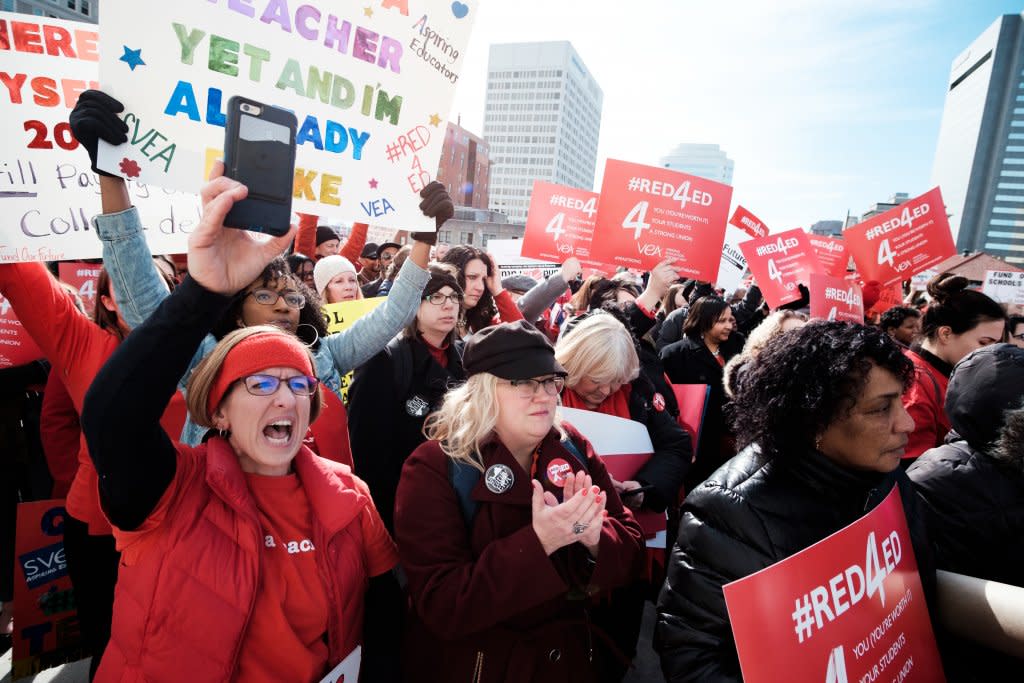Va. teacher pay gets a boost in budget, but it’s still projected to fall short of national average

- Oops!Something went wrong.Please try again later.
Thousands of demonstrators rallied for better teacher pay and more public school funding during a January 2018 rally at the Capitol. Education groups still doubt that the state's current spending on teacher salaries is enough to reverse current staffing shortfalls. (Ned Oliver/ Virginia Mercury)
Legislation that would have aligned Virginia teachers’ pay with the national average or higher by the 2027-28 school year won bipartisan support but was blocked from the state budget by Gov. Glenn Youngkin’s veto last week.
The two-year budget, signed last week, includes $540 million to help pay for 3% salary increases for teachers and state employees in both years.
The governor said he supported the goal of “ensuring that teachers and state-funded education support positions are funded competitively,” but didn’t approve the bill to boost educators’ salaries to the national average because it relied heavily on what he viewed as flawed data from the National Education Association, which represents educators across the country.
In his veto, the governor said the legislation does not “accurately reflect” the state of teacher compensation in Virginia and that NEA’s methodology includes substitute teacher compensation and fails to account for supplemental salary expenditures in determining teacher compensation. He added that the legislation does not account for various scenarios, such as an economic downturn or state of emergency, that could impact teacher pay rates.
The measure also didn’t include Youngkin’s earlier recommendation to create an annual teacher compensation review.
“Consistent, annual reporting of accurate teacher compensation data is essential for lawmakers and the governor to make sound decisions,” he said.
The governor further explained his veto by noting that since 2021, the state has invested $1.6 billion to grow teacher salaries by 23%.
Youngkin said that Virginia‘s average teacher pay was already projected to hit the national average this fiscal year.
The Virginia Education Association argued that the governor’s administration is “mistakenly” making comparisons between the estimated national teacher pay average in the National Education Association Rankings and Estimates report and the Virginia estimate in the Virginia Department of Education (VDOE) Annual Salary Survey Report.
“The estimates provided within these two reports are calculated using different data and methodologies and are not comparable,” VEA said in a statement on Friday.
According to NEA’s recent report, Virginia’s salary average is $65,058, which is below the national estimated average of $71,699.
Virginia, like other states, provides NEA data to compile state averages in their annual reports, removing non-instructional positions and allowing for an “apples to apples comparison” across all the states, according to VEA.
The Department of Education’s “Annual Salary Survey Report” includes all salary expenditures, including supplemental pay, for classroom teachers, homebound teachers, guidance counselors, librarians, and instructional technology positions, VEA stated. NEA includes only classroom teachers, substitutes, and homebound teachers and excludes supplemental pay.
While lawmakers debated the actual national average during this year’s session, they agreed compensation must be improved for teachers, as vacancies have grown since the pandemic. Youngkin’s veto magnified some Democratic lawmakers’ concerns with Virginia’s educator shortage.
“This school year began with over 4,000 teacher vacancies across our commonwealth, and the governor is not interested in attracting or keeping teachers here. If he was, he would have signed my bill that would have ensured Virginia teachers are being paid at the national average,” said Del. Nadarius Clark, D-Suffolk, one of the bill’s carriers, along with Sen. Louise Lucas, D-Portsmouth.
Clark added that the governor’s veto indicates where he stands on public education.
“When the governor lets our teachers down, when he doesn’t value them, he is telling the communities they serve and their students that they don’t matter either,” Clark said.
With Youngkin’s veto coming in the same week as the 70th anniversary of the landmark Brown v. Board of Education ruling — in which the Supreme Court of the United States mandated states desegregate public schools — Lucas said the inequities the case tried to address decades ago still persist in her community and throughout Virginia, which the governor’s rejection of the bill won’t help resolve.
“Governor Youngkin doesn’t care about public education and is determined to hold our students back,” Lucas said. “This is just a small part of his broader agenda to disenfranchise Virginians, and we will not stand for it.”
The post Va. teacher pay gets a boost in budget, but it’s still projected to fall short of national average appeared first on Virginia Mercury.

